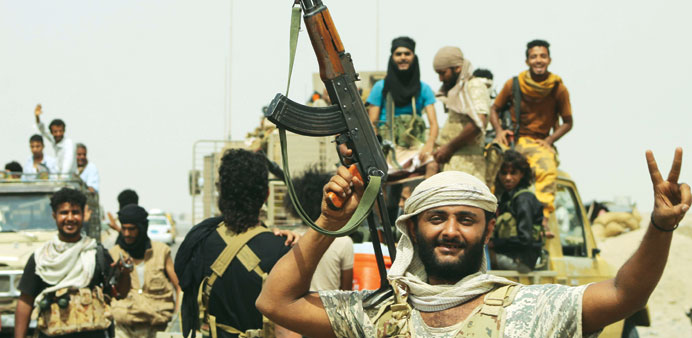Reuters
Aden
Fighters loyal to Yemen’s exiled president seized about 10 southern villages from Houthi forces yesterday, maintaining momentum in their offensive a day after capturing the country’s biggest air base, residents and loyalist sources said.
Clashes took place across the southern province of Lahj, most of which is now back in the hands of the Saudi-backed loyalist forces.
Militias siding with President Abd-Rabbu Mansour Hadi, who fled Yemen for Saudi Arabia in March, and army units trained and equipped by Gulf Arab countries have made advances against the Iranian-allied Houthis in recent weeks.
Yemeni military sources said the United Arab Emirates had sent in dozens of tanks and heavy artillery pieces to the fighters in recent days, though a spokesman for the Arab coalition denied media reports that it had sent ground troops.
Boosted by Saudi-led air strikes, the fighters drove the Houthis from the port city of Aden last month then pushed northward and recaptured the Al-Anad air base from Houthi forces on Monday after besieging it for days.
“The next step for the popular resistance and army forces after liberating Aden is the clearing of the provinces of Abyan and Lahj,” a commander in the anti-Houthi forces said.
Militia sources said that 1,000 Yemeni fighters trained in Saudi Arabia and the UAE arrived in Aden on Monday.
Yemen’s Arab neighbours intervened in the country in March to halt the advance of the Houthis—Shia Muslims from the north whose fighters seized the capital Sanaa in September and took over most of the country.
The Houthis have been pounded with hundreds of air strikes for more than four months and the raids and other warfare have killed more than 4,000 people. Disease, hunger and water shortages have also contributed to a humanitarian crisis.
The UN envoy to Yemen, Ismail Ould Cheikh Ahmed, renewed his call yesterday for an immediate ceasefire in the conflict, based on a plan involving Houthi withdrawals from main cities to pave the way for the exiled government’s return.
“There must be a withdrawal, a ceasefire and an agreement on them both,” Ould Cheikh Ahmed told Egyptian TV channel CBC.
“The government (must) return gradually to perform its duties in infrastructure and services...it must return to Sanaa and to the big cities, that’s essential,” he said.
The envoy believes his plan to end the conflict is increasingly gaining acceptance among the warring parties, a UN spokesman said in Geneva yesterday.
During his visit to Cairo, Ould Cheikh Ahmed met the secretary general of the General People’s Congress (GPC) party, which supports former president Ali Abdullah Saleh, and Nabil al-Arabi, the secretary general of the Arab League, UN spokesman Ahmed Fawzi said.
“He feels his plan is gaining more and more acceptance among the parties. Riyadh has indicated positive reaction towards the plan, the GPC is considering it positively,” he said.
UN-led talks in June between the rebels and supporters of the government failed to end the war.
The five days of talks in Geneva produced agreement in principle on a ceasefire and withdrawal of armed forces. The talks broke up before a final deal could be agreed, but Ould Cheikh Ahmed said he remained optimistic.
Fawzi said that after Egypt, Ould Cheikh Ahmed would go to Oman, where he has previously met Houthi representatives, and to Riyadh, and then to New York to brief the UN Security Council.

